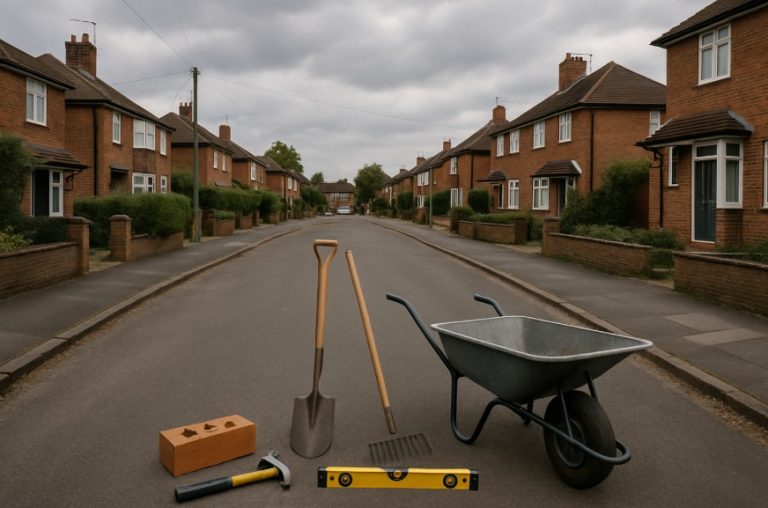Running a business from home is an increasingly popular route for entrepreneurs in the UK, especially with the flexibility it offers. However, those living in council houses often find themselves navigating a more complex path.
There are rules, permissions, and legal considerations that must be addressed before you can start. Questions around tenancy agreements, council regulations, and the type of business you want to run are key factors.
Whether you’re starting a side hustle or launching a full-time venture, understanding the groundwork is essential. This guide explores what’s involved in operating a business from a council-owned property.
What Must You Know Before Starting a Business from a Council House?

Operating a business from a council property involves more than simply setting up a desk and starting work. As a tenant in social housing, you’re subject to conditions that private homeowners may not face.
The property is not owned by you but managed by either a local council or housing association. Therefore, any activity that alters its use, impacts neighbours, or modifies the premises must be discussed with the landlord beforehand.
This is to ensure that your business will not interfere with the peaceful enjoyment of others’ homes, does not violate housing regulations, and doesn’t result in structural or financial consequences for the property provider.
Even if you’re confident your business is low-impact, you still need to inform the relevant authority before proceeding. Many councils encourage entrepreneurship but require you to follow due process.
Do You Need Written Permission to Run a Business from a Council Property?
Obtaining written permission is not optional—it’s a formal requirement. Whether your business is digital or customer-facing, the first step is always to notify your landlord or housing officer. You’ll usually be asked to complete a permission request form that outlines your business plan and its expected impact.
You’ll typically need to provide:
- A description of the business’s nature
- The frequency and timing of operations
- Whether customers or deliveries will be coming to the home
- Any alterations required to the property
- Potential impact on communal areas or neighbouring homes
Once submitted, your request will be reviewed. If approved, you may receive an updated tenancy agreement that reflects your right to operate a business from the premises. If not approved, the council will usually provide the reasons, which could range from potential disruption to violations of existing tenancy clauses.
Common Reasons a Council May Refuse Permission
| Reason | Description |
| Disturbance to neighbours | Noise, customer traffic, or delivery vehicles may be disruptive |
| Health and safety concerns | Risk of accidents or hazards to occupants |
| Structural changes | Major alterations that could damage the property |
| Use of hazardous materials | Chemicals or machinery that aren’t suitable in residential areas |
| Business type restricted | Some types, such as automotive repairs, are often disallowed |
Could Your Business Disturb Your Neighbours?
Neighbour disruption is one of the most scrutinised aspects of a home-based business application. Even if your operations are primarily online, councils will assess whether any aspect of the business may inconvenience surrounding tenants.
This includes:
- Frequent footfall from clients
- Deliveries at unsociable hours
- Noise from machinery or music
- Increased waste or odour
- Parking problems caused by commercial vehicles
Businesses like tutoring, freelance writing, and virtual consulting are rarely opposed, but a home bakery or fitness coaching operation with daily visitors might raise concerns.
In many cases, tenants are asked to restrict hours of operation or limit customer visits to minimise inconvenience.
Will Your Business Cause Damage to the Council Property?

Any modifications to the property—even seemingly small ones—may pose a concern to your landlord. Councils will consider whether your business is likely to cause cosmetic or structural damage.
If your business involves:
- Installing plumbing or electrics
- Using heavy or sharp equipment
- Producing dust, fumes, or smoke
- Storing large amounts of stock or hazardous materials
…you will likely be asked to clarify how these activities will be managed safely and whether changes can be reversed. Businesses like tailoring, accounting, or IT services are usually risk-free. But those that involve water use, heat, chemicals, or wear-and-tear on surfaces may face more scrutiny.
What Does Your Current Tenancy Agreement Say?
Most standard council tenancy agreements will include a clause that restricts or prohibits business activities from the home without express consent. This is to protect both the landlord and the tenant by ensuring residential properties are used appropriately and in a way that aligns with housing policies.
Before applying for permission, review your agreement to identify any terms around:
- Use of property for commercial purposes
- Visitors and client interactions
- Health and safety standards
- Structural changes or subletting
- Insurance obligations
Once permission is granted, you may be required to sign an addendum or entirely new tenancy agreement to reflect your business activities. This protects you legally and formally acknowledges your right to operate the business.
Are You Prepared for Extra Costs and Utility Bills?
Running a business from home often results in higher utility bills. Depending on the nature of the business, you may see an increase in water, electricity, internet, and heating usage.
Some landlords may:
- Require a small rent increase to offset these costs
- Ask for a contribution toward building maintenance if applicable
- Provide a separate meter for specific business-related consumption
Here’s a simple example of how business activity can impact household bills:
| Utility Type | Business Impact |
| Electricity | Increased use from equipment, computers |
| Water | More usage for services like hairdressing |
| Internet | Need for faster or business-grade connection |
| Heating | Longer operating hours in winter |
Managing these costs requires early planning. You may need to allocate a portion of your monthly income specifically to these added expenses.
Have You Got the Right Business Insurance and Licences?

Operating a business from a council home means assuming the full legal and financial responsibility for anything that goes wrong. Standard home insurance usually won’t cover business-related incidents, so you’ll need specialist coverage tailored to your operations.
Essential Insurance Types:
- Public Liability Insurance: Covers accidents involving customers or clients on your property
- Employers’ Liability Insurance: Legally required if you employ staff, even part-time
- Professional Indemnity Insurance: Protects against claims arising from advice or consultancy services
- Contents Insurance: For business tools, stock, or equipment
- Cyber Insurance: Important if you manage customer data or operate online systems
Depending on your business type, a licence may also be required. Examples include food services, beauty therapy, or childcare. The licensing ensures you meet local authority standards for health, safety, and business practice.
How Does Tax and Business Rates Apply to Council House Businesses?
Operating a business from a council house brings with it financial responsibilities beyond general business income and expenses. As a council tenant, you’re still subject to the same tax and rating rules as any other business owner in the UK. It’s essential to understand how taxation and business rates apply, particularly if you’re using a part of your home for commercial activity.
Business Registration and Taxation
All businesses in the UK, regardless of where they operate from, must be registered with HMRC. If you’re operating as a sole trader, you need to register for Self Assessment and file an annual tax return declaring your income and allowable expenses. Limited companies must also register with Companies House and follow corporation tax rules.
You are required to pay tax on profits, not total income. It’s therefore important to maintain accurate records of:
- Business income
- Operational expenses
- Mileage and travel costs
- Use-of-home deductions (if applicable)
If your business earns over the VAT threshold, VAT registration becomes mandatory. While working from home can reduce overheads, it doesn’t exempt you from standard business obligations.
National Insurance Contributions
Depending on how your business is structured, you may be liable for Class 2 and Class 4 National Insurance contributions (sole traders), or employer and employee NICs (for limited companies with payroll). This will depend on your earnings and setup.
Business Rates and Home Use
Business rates are the non-domestic equivalent of council tax. You may need to pay them if you use a substantial part of your home exclusively for business purposes. However, not all home-based businesses qualify.
You may be liable for business rates if:
- You’ve converted part of your home into a workspace (e.g. garage, extension)
- Clients visit your home regularly for business services
- You employ staff who work from your property
- You display signage or separate business access
The local Valuation Office Agency (VOA) assesses whether business rates apply based on usage and layout.
Tax Reliefs and Allowances

Home-based business owners can often claim a portion of household expenses—such as utilities, broadband, and rent—as allowable business costs. HMRC provides simplified flat-rate options or detailed calculations based on actual usage. These deductions help reduce your overall tax bill and make home working more financially viable.
Conclusion
Living in a council house does not mean you’re excluded from entrepreneurial opportunities—but it does require you to follow the correct process.
From obtaining written permission and reviewing your tenancy agreement to managing your neighbours’ expectations and understanding legal requirements, each step is important. Planning properly from the start ensures your business can grow without complications.
By staying compliant with your local authority and addressing potential concerns early, you’ll build a solid foundation. With the right precautions and permissions, your home can support not just your lifestyle—but your business goals too.
FAQs About Running a Business from a Council House in the UK
Can I sell products from my council house?
Yes, but only with written permission from your landlord or council. The business must not cause disruption or breach your tenancy agreement.
Do I need planning permission to run a home business?
Not usually, unless the business changes the primary use of your home, causes frequent client visits, or involves structural modifications.
What happens if I run a business without informing the council?
You may be in breach of your tenancy agreement, which could result in a formal warning, eviction, or legal action.
Will running a business affect my benefits or council tax?
Yes, if you’re on Universal Credit or Housing Benefit, additional income could impact your eligibility. You may also be liable for business rates.
Can I have clients or customers visit my home?
Yes, with approval. If the visits are frequent and cause disruption, your request may be denied or restricted.
Can the council refuse permission to run a business?
Yes, especially if your business is likely to disturb neighbours, alter the property, or go against housing policy.
Do I need special insurance to run a business from home?
Yes. Home insurance alone is not enough. You’ll need specific business cover based on your operations, clients, and property use.






